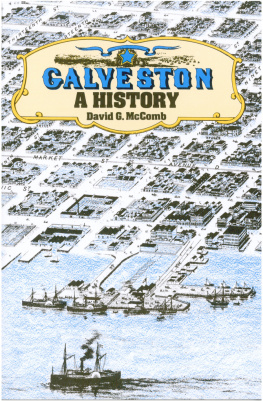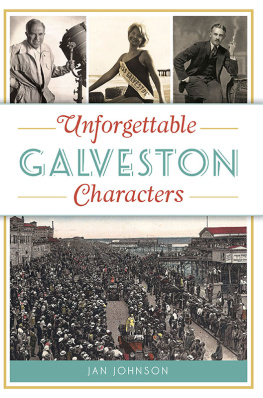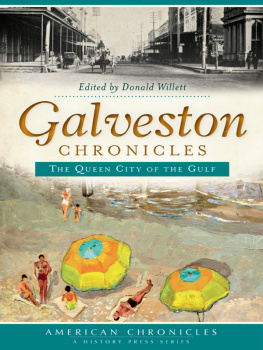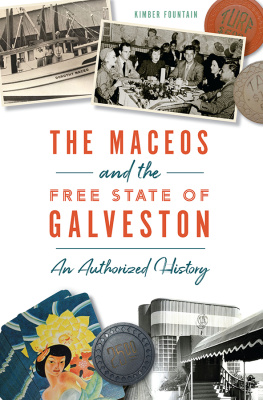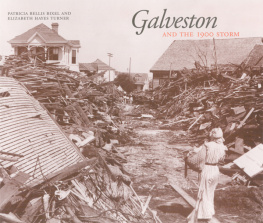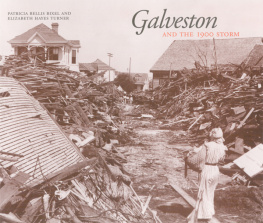McComb - Galveston: a history
Here you can read online McComb - Galveston: a history full text of the book (entire story) in english for free. Download pdf and epub, get meaning, cover and reviews about this ebook. City: Austin;TX;Galveston Region (Tex.);Galveston (Tex.);Texas;Galveston;Galveston Region, year: 2010, publisher: University of Texas Press, genre: Art. Description of the work, (preface) as well as reviews are available. Best literature library LitArk.com created for fans of good reading and offers a wide selection of genres:
Romance novel
Science fiction
Adventure
Detective
Science
History
Home and family
Prose
Art
Politics
Computer
Non-fiction
Religion
Business
Children
Humor
Choose a favorite category and find really read worthwhile books. Enjoy immersion in the world of imagination, feel the emotions of the characters or learn something new for yourself, make an fascinating discovery.
Galveston: a history: summary, description and annotation
We offer to read an annotation, description, summary or preface (depends on what the author of the book "Galveston: a history" wrote himself). If you haven't found the necessary information about the book — write in the comments, we will try to find it.
McComb: author's other books
Who wrote Galveston: a history? Find out the surname, the name of the author of the book and a list of all author's works by series.
Galveston: a history — read online for free the complete book (whole text) full work
Below is the text of the book, divided by pages. System saving the place of the last page read, allows you to conveniently read the book "Galveston: a history" online for free, without having to search again every time where you left off. Put a bookmark, and you can go to the page where you finished reading at any time.
Font size:
Interval:
Bookmark:
GALVESTON: A History

GALVESTON
A History
by David G. McComb
 UNIVERSITY OF TEXAS PRESS
UNIVERSITY OF TEXAS PRESS
Austin
First Fig, by Edna St. Vincent Millay, reprinted by permission.
From COLLECTED WORKS, Harper & Row. Copyright 1922, 1950 by Edna St. Vincent Millay.
Copyright 1986 by the University of Texas Press
All rights reserved
Printed in the United States of America
Eighth printing, 2010
Requests for permission to reproduce material from this work should be sent to:
Permissions
University of Texas Press
P.O. Box 7819
Austin, TX 78713-7819
www.utexas.edu/utpress/about/bpermission.html
Library of Congress Cataloging-in-Publication Data
McComb, David G.
Galveston: a history.
Bibliography: p.
Includes index.
1. Galveston(Tex.)History. 2. Galveston
Region(Tex.)History. I. Title.
F394.G2M36 1986 976.4139 85-20956
ISBN 978-0-292-72053-4 (pbk.)
ISBN 978-0-292-74735-7 (e-book)
ISBN 978-0-292-79321-7 (individual e-book)
To my family and friends who, during the writing of this book, put up with me when I was there, and when I was not.
ILLUSTRATIONS
Maps
Figures
GALVESTON: A History
PREFACE
Every historian has an ax to grind.
Frank Vandiver (1961)
What Frank Vandiver meant when he made that statement to a group of his graduate history students at Rice University was that everyone, even professional historians, carries a load of prejudices and biases. He was correct, of course. We all have our ideas about why something happened, or what is important, and this is what we write about. Hopefully, historians know their predilections and can forewarn readers. It is best for everyone to recognize the historical filter through which a writer views the past.
Although I lived for short periods in various parts of the city of Galveston and down the island at Jamaica Beach during the twelve years of research for this study, I could never be considered an insider. I am neither a BOI (Born on the Island), nor an IBC (Islander by Choice). Galvestonians tend to judge people on that basis. Worse, I grew up in Houston, the great rival and bte noire of Galveston history. My early memories, fragmented and distorted, include a ride to the beach over the unfinished Gulf Freeway in a 1946 Ford with my brother at the wheel and the windows rolled all the way down to circulate the oven-heat of the Texas summer. The white dust from the oyster shell foundation rose in a huge cloud behind us and drifted onto the low trees along the right-of-way. They remained white until the next rainfall.
There are also recollections of illegal beer gulped with youthful bravado; a Boy Scout troop sleeping on the sand, forgetting about the consequences of high tide; and a happy fire and warm date in the moonlight of West Beach. Sometime around my sophomore year at Lamar High School in Houston I began to suspect there was something else going on in Galveston. When the name of the island came up in conversation, adults raised their eyebrows and spoke with innuendoes, while my peers used crude jokes and leers.
Later, Galveston became interesting for academic reasons. While teaching at the University of Houston and working on Houston, the Bayou City, I visited the Rosenberg Library in search of materials. The new wing had not been built and I looked through yellowed business records in a close, dark-paneled room. Toward the end of my work there the assistant archivist, Bob Dalehite, said, Come with me, I want to show you something, and led the way to the attic. It was filled with dusty cardboard boxes of unsorted letters, journals, and records scattered amidst old cannonballs and other artifacts of Galveston history. It was a treasure trove of items about the most important city of Texas during the nineteenth century. I was impressed, and for over a decade I pursued the history of the Island City whenever I could.
I teach, among other subjects, the history of technology. Some scholars have long known about the importance of technology in human life. The journal Technology and Culture, for example, goes back to 1959, and there have been many books published on the subject. Only recently, however, have historians begun the exploration of technology and the city. Although no historian has yet advanced a thoroughgoing technological interpretation of history, there is power in the suggestion that technology is the dynamic element in human development. Anthropologists have long assumed this, and so did Walter Prescott Webb in his study of western America, The Great Plains. When motivated people use the resources of their environment with their knowledge of how to do things, change occurs. Change is history, and technology is an important dynamic element.
Such a theoretical approach to history demands a discussion of the environmentgeography and natural resourcesin order to explain how people interacted with the land to form a city. It is also necessary to know about the individuals who came to the site, their motivation, and the technological baggage which came with them. The history involves what historian Roy Lubove called the process of city building over time. It is important to know why some cities grow, as in the case of Houston; why some die, as in the case of Indianola; and why some stagnate, as in the case of Galveston.
There is something special, in addition, in regard to Galveston which has to do with the character of the city. Character is difficult to define, but it involves how people feel about a place. Analysis is not subject to social scientific techniques, although Kevin Lynch came close in The Image of the City. People dislike or like places because of their experiences. These vary with individuals, and so character falls into the humanist realm. The feeling is emotional. Galveston is unlike any other Texas city and visitors immediately sense it, but the dissimilarity is hard to define for the satisfaction of all people.
This history of Galveston, therefore, is a narration about the development of the city. There is a bias toward technological events, but there is also an attempt to explain how people working in the Gulf Coast environment gave Galveston its distinct character. Fortunately, there is a lot of information about the Island City. The Galveston Daily News has the longest run of any newspaper in the state, and it is a prime sourcelike a daily diary. It has its prejudices, of course. The paper, for instance, did not print pictures of black student graduates until 1962, although it had featured white students since 1907. The minutes of the city government still exist, and the archivists at the Rosenberg Library moved the dusty boxes from the attic. They successfully built the best urban archives in Texas.
Over the years, moreover, there have appeared some fine books about the city. Among the best are Howard Barnstone, The Galveston That Was; Charles W. Hays, Galveston; Margaret Swett Henson, Samuel May Williams; Earl Wesley Fornell, The Galveston Era; Bradley Robert Rice, Progressive Cities; John Edward Weems, A Weekend in September; and Kenneth W. Wheeler, To Wear a Citys Crown. There are other individuals who have contributed to the knowledge of Galveston history through articles, speeches, bibliographies, and oral history work. These include Paul Burka, Bob Dalehite, Maury Darst, Virginia Eisenhour, Robert L. Jones, and Robert A. Nesbitt. I have benefited from their efforts and interest in Galveston.
Some people have aided me directly with my research, guided me around pitfalls, and pointed the way. A special note of appreciation, therefore, should go to: Jane Kenamore, the archivist of the Rosenberg Library; Colleen T. Kain, the executive assistant of the Texas State Historical Association; and two anonymous critics who evaluated the manuscript for the University of Texas Press. They appropriately pointed out errors and suggested improvements. One of the points raised concerned the use of dialect in quotations. Various sources of information, such as letters, newspapers, and books, reported conversations in what would be now considered a patronizing manner. As a historian I should recount the past as accurately as possible, but what should I do about dialect? On the one hand, the reported conversation may be insulting. On the other hand, that was the way the information was recorded, and people do, after all, speak with dialects and colloquialisms, sure enough. So, throughout the book, I report the conversations, misspellings, and local dialects as written in the original sources. These include references to uneducated whites, pirates, blacks, Germans, children, and others of undefined origin. The statements of the elite, regardless of ethnic group, are treated the same way. This is the stuff of history, and I am hesitant to tamper with it. It is a reflection of the times, and should be treated with respect while recognizing the possible patronizing attitude with which it was recorded. I will trust the maturity of the reader to recognize my use of quotations, and also the possibility of inadvertent factual error. Such faults are not intended and rest on the shoulders of the author.
Next pageFont size:
Interval:
Bookmark:
Similar books «Galveston: a history»
Look at similar books to Galveston: a history. We have selected literature similar in name and meaning in the hope of providing readers with more options to find new, interesting, not yet read works.
Discussion, reviews of the book Galveston: a history and just readers' own opinions. Leave your comments, write what you think about the work, its meaning or the main characters. Specify what exactly you liked and what you didn't like, and why you think so.

